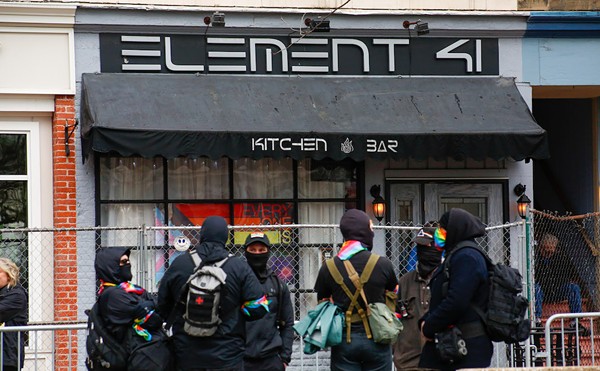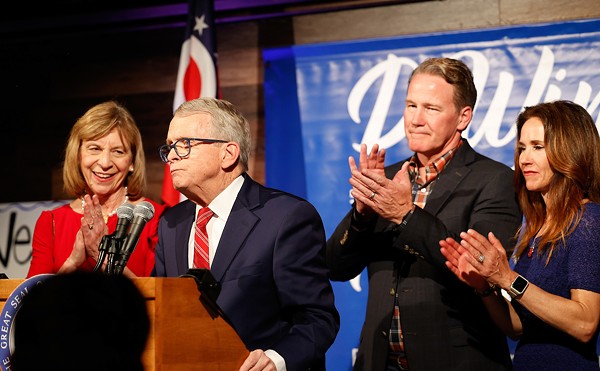Ten minutes before tip-off, Cavalier guard Jim Jackson is immersed in a ritual that dates back to his high-school phenom days in Toledo. Bent at the waist, he bounces a ball low the floor. Switching hands, he dribbles figure eights around and between his legs. The ball patters on the hardwood like a hummingbird's wings.
The precision of Jackson's drill contrasts with an NBA career that has run with all the imprecision of a pickup game. A two-time All-American at Ohio State, he left school after his junior season with skills and a personality stamped for greatness. Nine years later, Jackson is playing for his seventh NBA team. Reporters usually modify his name with the phrases "well-traveled," "oft-traded," and "journeyman."
His stack of change-of-address forms suggests a malcontent, a player whose 17.4-point career scoring average is not worth the headaches. But, by most accounts, the 30-year-old Jackson is anything but a punk. He's smart, meticulous, and in the words of a former coach, "has all the qualities I think any of us would want our sons to have."
But on this night at the Gund, what the Cavs need is a star. Since an injury to Zydrunas Ilgauskas, the team has been in free fall, and the Lakers, playing without Shaquille O'Neal, present an opportunity for rebirth. Yet Jackson will roam the perimeter on this night, invisible for long stretches of the clock. He hits just 4 of 13 from the floor. Los Angeles prevails.
He was supposed to be Ohio's greatest contribution to basketball since Jerry Lucas. He wasn't supposed to be traded like a tech stock or find himself with just nine points to show for a cold winter's night in Cleveland.
He struck a gilded form as an amateur. As a seventh-grader, Jackson stood 6-foot-2 and could dunk. With a jump rope around his neck, he prowled Toledo gyms and blacktops for games. "He was a mature basketball player at 13, 14 years old," says Calvin Lawshe, an AAU coach at the time of Jackson's emergence. Lawshe, now an assistant to the president of the University of Toledo, has remained close to Jackson. "As he continued to work on his game and play against older guys, it simply added to his maturity and understanding of the game, as well as life."
Jackson was a stubborn kid, eager to accept a challenge. "He was more scared to lose than anything," says Tony Ross, a friend since kindergarten. "He never wanted anything to get the best of him."
As a freshman at Macomber-Whitney High School, Jackson had grown into a 6-5, 200-pound man. He made varsity and, for the next four years, dominated Toledo high- school courts with an almost unfair package of size and agility. When opposing teams devised defenses to wall off his sleek perimeter game, Jackson killed them in the paint. His talent was the buzz of Toledo. Macomber played in a cracker gym, so games were moved to a larger facility that held 3,000. In his senior year, Macomber won the state title, losing once all season. Twice he was named Ohio's Mr. Basketball.
Nothing about him was a fluke. Lawshe says Jackson's parents -- Dad drove a bus, Mom was a secretary -- imbued their son with a strong work ethic and an aversion to distractions. "He never had a desire, as a lot of young guys do, to just be around, to run around. He would be content to sit at home with a pizza and watch a movie, as opposed to gathering on the street corner with buddies just for some laughs and some fun. That just wasn't his makeup."
Former Buckeye great Jim Cleamons, now a Lakers assistant coach, first saw Jackson play during the latter's sophomore year of high school. Cleamons fell in love with his game -- physical skills and the brains to use them. "And I was impressed with him as a person as much as I was with his athletic talent," Cleamons says.
With expectations piled high when he arrived at Ohio State in 1989, Jackson didn't disappoint. During a practice his freshman year, big man Treg Lee dunked on him. A few plays later, Jackson returned the favor, thundering one home on Lee's head. "I was like 'Man, that dude is for real,'" former teammate Jamaal Brown says. Ohio State played UNLV in the NCAA tournament that season, and Mark Baker, another former teammate, remembers a play when Jackson reverse-dunked on a drive from the baseline. "I knew he could play," Baker says, "but that put the stamp on it for me, personally, to know that he was a superstar."
He was the Big Ten's Freshman of the Year, and Player of the Year his sophomore and junior seasons. He could score, he could pass, he could abuse smaller guards with his ripcord, 6-foot-6 body. "He was kind of a throwback player," says former Buckeye Clark Kellogg, now a television analyst. "He wasn't real flashy, but he was strong and solid and a clutch performer."
The Buckeyes of the early '90s were a lovable bunch. Embodying romantic notions of the college spirit, the players related to -- and wanted to win for -- their young black coach, Randy Ayers. Before weeknight home games, they sat down to watch reruns of the '70s show Good Times in the TV room. "We always hung out together; we were always close," Brown says. "I don't know if it was our signs or what, but we always got along mentally, and we always cared for each other when we were out on the court." In addition to being the team's most talented player, Jackson was handsome and polished, glowing with regal charisma. "Even though I was older than him, I looked up to him as a big brother," Baker says.
Off the court, Jackson was more likely to seek solitude than to hang with the fellas. He'd choose to shoot pool by himself, rather than troll the clubs. When he did attend a team party, Jackson slipped into the crowd as if he were a walk-on. "Jimmy would just come over and play cards," says Kevin "Spanky" Richards, the OSU student manager at the time. "He didn't need to drink or be the center of attention."
In Jackson's junior year, Ohio State went 26-6 -- but lost a heart-crusher to Michigan's Fab Five in the NCAA tournament. When the Buckeyes returned to Columbus late that night, thousands of fans gathered in St. John Arena to cheer and cry. To little surprise, Jackson declared himself eligible for the NBA draft shortly after the season ended.
Lottery picks don't regret their decisions to leave school early, but Jackson thinks he mistook for tedium the simplicity of the college experience. "We were trying so hard to get out of that situation and get to the next level, you didn't appreciate why you were there and how much fun you had." He still looks much as he did at Ohio State -- the angular nose, the wounded eyes. "You look back at it, and you can't replace it."
The Dallas Mavericks selected Jackson with the fourth pick of the 1992 draft. The Mavs were disheartened not to win the first pick -- and thereby draft Shaq -- but pleased to find a player of Jackson's abilities. They needed all the help they could get. After making the playoffs in 1990, the Mavs lost Sam Perkins to free agency and added crusting veterans like Fat Lever and Alex English. Roy Tarpley was banned from the league for thrice violating the substance-abuse policy. Old and hobbled, Dallas went 50-114 in the two years before drafting Jackson. "We were such a bad team," says Detroit Pistons General Manager Rick Sund, the Mavericks' GM at the time.
This was before the NBA instituted its rookie salary grid, which virtually assigns salaries and contract lengths to incoming players. Jackson wanted a six-year deal from the Mavericks. The team offered four. Sund thought Jackson and then-owner Don Carter each should have grabbed what the other was offering. By taking the shorter deal, Sund says, Jackson would have been a free agent at the height of his value; and if Dallas had given Jackson what he wanted, the team could have locked up his talents for six years at rookie prices.
Jackson felt the real world's cold hands in ways beyond a contract dispute. During his holdout, he was accused of waving a gun and threatening passengers in another car while driving in Columbus. Jackson denied the charges, and a Franklin County jury believed him.
He eventually signed a six-year, $19 million deal, but not before holding out for 54 games. He was, however, better prepared than most young athletes to sit out, then join a roster of bumbling teammates. His rookie season, the Mavericks threatened to break the NBA record for losing in one season, set by the 1972-'73 Philadelphia 76ers, who went 9-73. The Mavs finished 11-71. His second season, they got off to a 1-23 start.
Yet Jackson began to shine. His first two years, he averaged 16 points and 19 points per game. The media thought him a stand-up guy who readily fielded questions at his locker, win or lose. He also endeared himself to the community, erasing the hard feelings left by his holdout. He hosted a radio show and filled children's autograph books. Some athletes don't appear in public unless accompanied by a phalanx of cameras, but Jackson often asked that his good works go unpublicized. Kevin Sullivan, the Mavericks' public-relations director from 1980 to 1998, says no player better addressed teenage audiences than the thoughtful Jackson.
In 1994-'95, his second full season, the NBA got acquainted with what J.J. fans in Toledo and Columbus had watched with such pride. Jackson averaged more than 25 points a night. He scored 30 points or more 15 times, including a 50-point rainbow against Denver that led the Mavs back from a 25-point deficit.
In consecutive drafts, Dallas added Jamal Mashburn and Jason Kidd, whose credentials were as impressive as Jackson's. With the "Three Js," the Mavericks' future looked as bright at the twinkling Dallas skyline. But one night in New Jersey, Jackson drove the lane and landed on someone's foot. It was a gruesome sight. His left ankle collapsed, the ligaments stretched to near-breaking point. The sprain cost him the last 31 games of the season. Prior to that moment, he had never missed a game at any level due to injury. "Before that injury, he was an unstoppable guard," Sullivan says. "He developed an outside game. He'd become a pretty good outside shooter. He drove to the basket as well as anybody in the league."
The control, the precision he so cherished, vanished in an instant. Today, Jackson says it would have been better if he had snapped the ankle in two. "It happened at a critical time in my career. That's when I was the best two-guard in the league, and I was rolling. But things happen in life for a reason. It gave me a whole new perspective on life, a whole new perspective on basketball."
Adversity opens the window of introspection; sidelined, Jackson looked within. "I learned more about myself; I matured more as a man. But I learned more about how people are. When you're on top, everybody pats you on the back, everybody loves you. But when something happens, that's when people tend to turn their back and go against you. When I hurt my ankle, all that came out, all the disloyalties. But I kept my head on, and I learned from it."
With Jackson out, Kidd and Mashburn took over the offense. At year's end, Kidd shared Rookie of the Year honors with Grant Hill. Kidd thanked Jackson for getting hurt, allowing him more touches. The comment may have been intended as a joke, but it foretold power struggles that bordered on soap opera. The Mavericks still lost more games than they won, and without a veteran to shepherd the young stars, the sniping began.
Jackson's scoring average dropped by six points the next year. Was Jackson a half-step slow -- or fighting for shots with Mashburn? The players said any heat between them was a temporary flicker, the natural combustion of talented, competitive teammates. But when Coach Dick Motta -- who once arbitrated a three-hour, smoke-clearing session between Jackson and Mashburn -- was asked if the two young stars could play together, he replied with typical apocalyptic flair, "I guess if there could be peace in the Golan Heights and peace in Belfast, anything's possible."
After the '95-'96 season, new owners replaced Motta with Cleamons. Jackson's fourth coach in five years, Cleamons said the team needed to grow up. His call went unheeded. Jackson and Kidd began feuding.
Earlier in their careers, Jackson and Kidd visited each other's off-season stomping grounds, but their relationship by now had dissolved to the point that some days, they didn't speak. Teammates watched, baffled, as the two extended their animus to the court, each sometimes acting as if the other had leprosy. Before the '96-'97 season, Kidd asked that one of them be traded. He later retreated from his demand, but a truce would never be reached.
Most NBA watchers believe the rift ran deeper than scoring averages. It was reported that on a trip to Atlanta in 1995, Jackson stole the affections of pop singer Toni Braxton from Kidd. Jackson and Kidd denied it, Braxton played coy, and the media ran with the story. The tale still has legs; Sports Illustrated referred to the purported love triangle in a recent article about the tiff between Shaq and Kobe Bryant.
Yet Jackson maintains the Braxton story was a publicity stunt orchestrated by the singer; he never met her. Kidd also denies meeting Braxton. But Motta, a year and a half after he was let go, confirmed to a Dallas newspaper two instances in which Jackson and Kidd clashed over women (one of them being Kidd's fiancée), and called Jackson a "cancer."
"The easiest way to get rid of a malignancy is cut it out," Motta said. "We should have pulled the trigger. But we didn't."
Messages left at Motta's Idaho home were not returned. Kidd, who now plays for the Phoenix Suns, responded to questions via e-mail. "I think Dick Motta might be getting a little senile, because [then-fiancée and now-wife] Joumana wasn't in Dallas, and I didn't get engaged there," he said.
Eventually, triggers were pulled. Kidd was traded to Phoenix in 1996. Shortly thereafter, Don Nelson was hired as the Mavericks' GM. For Nelson, Kidd's removal didn't sufficiently scrape away the diseased cells. He labeled Jackson a "crybaby." Within two weeks, Nelson had traded everyone but the ballboys, sending Jackson to New Jersey and Mashburn to Miami in multiplayer deals. "Nelson wanted to turn over the entire roster, and that's what he did," Sullivan says.
Nelson revamped -- but didn't revitalize -- the Mavericks. Until this year, Dallas hasn't had a winning season since cleaning house.
Time has a way of diluting turmoil. Today, some of those who were in Dallas downplay the infighting, suggesting babies were thrown out with bathwater. "I certainly felt that, yes, there were changes that needed to be made," Cleamons says, "but I did not include Jimmy as one of the people who needed to be moved on for the benefit of our team."
"It was a joke," says Cavs forward Chris Gatling, who was traded with Jackson from Dallas to New Jersey. "I think they were trying to hit a home run with two high pitches, instead of waiting for that right strike. It might have taken two or three years, but look at how we'd have been. Dallas just got good this year."
Like Gatling, Jackson projects blame onto the guys in the suits. He says that because of injuries, the Three Js played less than a full season together. Management never gave them a chance to mature, he believes, and Nelson relied on the players' reputations as incorrigibles. "He never came into the locker room. That's bullshit, when he says he came into the locker room and saw this or that. He came to one shootaround. He never sat down and talked to any of us. He used that as an excuse to make the trades, that's how I see it." Lawshe adds that Jackson is friendly with Mashburn and Kidd today, "and I'm not speaking in terms of passive hellos and good-byes on the basketball court."
Says Kidd's e-mail: "Jimmy and I have a good relationship. When I see him, I always say hello to him, so that's all I can really say."
But whether victim, bystander, or instigator, Jackson had attracted a stench.
Early in his NBA career, Jackson's progress was measured in glittering box scores; by his fifth year in the league, simply tracking his whereabouts was a chore. He finished the '96-'97 season with the Nets and was then traded to Philadelphia. After 48 games in Philly, he was dealt to Golden State.
Jackson's vagabondage can be looked at two ways: Either teams didn't want him, or teams wanted to get him. The NBA's salary-cap restrictions are such that clubs have to trade dollar for dollar, encouraging them to swap players by the bundle. Cleamons says that near the end of Jackson's initial, six-year contract, Jackson was making middle-class money. "The quality of player that you had versus the salary he's based at -- I can see where he becomes a very attractive person that you would like to have on your team."
Adds Sund: "One interesting thing is, every team he goes to, he gets minutes at all of them. It's not like he goes to a team and they don't play him. Everywhere he goes, he's in that six- or seven-man rotation, either as a starter or the first guy off the bench."
Still, none of this fully explains why Jackson has been passed around like a Canadian nickel. Kellogg believes the ankle injury cost Jackson, never a great outside shooter, the burst that separated his game from the pedestrian. He compares him to players like Phil Hubbard and Ron Harper, slashers who remade themselves into handymen. "He's been more of a jack-of-all-trades, a utility guy," Kellogg says.
"He's lost of lot of explosiveness," says San Antonio Spur Samaki Walker, a high school star in Columbus while Jackson was at Ohio State. Walker was a rookie in Dallas the year management blew up the Mavericks. "It's mentally tough, when you have an injury like that that doesn't heal. To this day, I don't think it's fully healed."
"I think his lift is a little suspect at times," Gatling says. "He doesn't have that explosiveness that he had, but he's still quick, he can still handle the rock, he's still strong as an ox, and he can still post up. I figure, like they say, you can't jump higher than the ball. He gets his shot off, and that's all that matters."
Jackson says his fall from the elite has less to do with an injury's lingering effects than with his game not being showcased. He is able to recall his stats with exactitude, and notes that he led the Mavs in scoring the year after his sprain. "I haven't played the same because I wasn't in the same system," he says. "In Dallas, the ball was in my hands -- out of 10 possessions, at least 5 or 6. You're gonna produce. I don't think people understand, if you're an offensive player, there's no way you're going to score if you only get eight touches, seven touches, six touches, or if you touch the ball every four minutes or five minutes. You're not going to be productive, game in and game out, if you're used to having quantity and quality. That's been the biggest difference."
Jackson acknowledges the drama in Dallas left him with a reputation. "Definitely, but there's nothing I can do about that. What can I do, except keep playing? I don't worry about that too much. People give you a 'stigmatism' when you're playing well. People give you one when you're not. It's always going to be like that."
So what would he do differently?
"I wouldn't have got hurt."
At the end of the '97-'98 season, Jackson was finally a free agent. He hadn't seen this kind of freedom since he was a coveted high-school player weighing scholarship offers. Jackson signed a three-year deal with the talent-rich Portland Trail Blazers that pays him less than $2 million annually, a working man's wage in the NBA. Portland was one of the few teams where Jackson wouldn't start. After wandering the NBA wilderness, playing for teams that went a collective 135-299, he traded minutes for wins. "I wanted to feel what it was like to be on the other side of the NBA, to be competing for an NBA championship, to be a premier team," he says. "Sometimes you gotta give up financially what you could have got somewhere else, in order to experience that."
Jackson averaged a career-low 8.4 points a night in Portland, but received some of his best reviews in five years. In the games he started, the Trail Blazers went 8-1. "Let's cut the fat away," says Blazers Assistant GM Mark Warkentein, who says he had "zero" reservations about signing Jackson. "When he arrived here, we had not gotten out of the first round of the playoffs in six years. The year we got him, we got to the Western Conference Finals. In my house and in my office, we loved him."
But Jackson's stay in Portland lasted all of six months; he was traded with Isaiah Rider to the Atlanta Hawks for Steve Smith before the 1999-'00 season. Warkentein says Portland needed to thin its roster. The trade allowed the Blazers to pick up Smith, a pure shooter, and make room for the ascendant Bonzi Wells. Still, the Blazers feel they lost a class act. "He was great with my wife, great with my kids," Warkentein says. "He got the job done on and off the floor. The NBA season is like a marathon, a marriage, and he has the personality you could get through the year with."
Samaki Walker agrees: "He's not a nagging guy. He's not an irritating guy. He's one of those people you like to be around. You can talk to him."
Alas, Jackson's disposition didn't save him from being a side dish. Hawks GM Pete Babcock told Jackson he was an insurance policy against Rider's notoriously volatile behavior. "My perception on how he handled it was that he may not have really liked it, but he told me he appreciated me being honest with him," Babcock says.
But Atlanta also proved a temporary home. A knee sprain twice sent Jackson to the injured list earlier this season. The Hawks moved second-year man Jason Terry to his shooting-guard spot, and Terry blossomed, scoring more than 20 points a night. Terry's rise and the Hawks' need for a point guard blew the trade winds again. Jackson, though elected co-captain, was shipped to Cleveland for Brevin Knight on January 2.
Almost nine years had passed since he waved to the crowd at St. John. Jimmy -- by way of Dallas, East Rutherford, Philadelphia, Oakland, Portland, and Atlanta -- was back in Ohio.
"Clean it up!" Cavs head coach Randy Wittman yells during a chippy afternoon scrimmage in Gund Arena's practice gym. Hips and elbows are flying, and Wittman senses that one more hard check could lead to punches. The session ends peacefully with foul-shot drills.
Teammates head for the showers; Jackson lingers on the court. He fires jump shot after jump shot, while assistant coach Keith Smart feeds him passes. As Jackson toils, Wittman is asked the question Jackson's name usually elicits: Why is he playing for his seventh team? "He's got what a lot of teams want, obviously," Wittman says. "That's not a bad thing. People look at that as a negative, but his dimensions -- and intangibles that he brings -- are things that a lot of teams look at and would like to have."
After so many flashes across the transaction wire, Jackson's friends say he recognizes that his skills are a commodity. "If you spend your time worrying about what management's going to do, you'll go crazy," says Atlanta Hawk Alan Henderson, one of Jackson's NBA confidants. "That's the kind of thing that opened his eyes, as many times as he's been traded. It's a business. You gotta realize that."
Gatling, himself an NBA gypsy, says trades get easier with time. "The first couple of trades, I'm wondering why. I know I'm a good player and I have an All-Star under my belt. I was like 'Whoa, why me?' I'm sure he feels the same way."
Lately, it's the basketball that's been asking, "Why me?" As a Cav, Jackson is shooting a dreary 37 percent from the field. Against San Antonio on February 7, the crowd grumbled as Jackson clanked 10 of 12 shots. Early in the fourth quarter, with the Cavs trailing by a dozen, Jackson bricked an 18-footer from the left corner. The Spurs hurried the rebound down the floor, and ex-Cav Danny Ferry nailed a three-pointer. Jackson sat down the last 10 minutes of the game, which Cleveland lost, 107-89. He is averaging 11 points a night, the lowest total since his run in minute-starved Portland.
Jackson has said all the right things about finding his way to Cleveland, and surely he means it. But rediscovering something in his game, just because he's breathing Ohio air again, seems remote. "I see him out there, and he's playing, but I don't know if he loves the game," says Jamaal Brown. "He's fortunate and blessed to play for teams that want him. A lot of players would love to be in his situation. I just don't think he's found the right spot yet."
Jackson wearily uses the word "perspective" when reporters ask about icy shooting nights, the scuffling Cavs, and his peripatetic career. He thinks of himself as a business executive or a lawyer, hired to do a job -- and ready to move when a new offer calls. He asks for no tears. "There's worse things than getting traded in life. . . . I got people out there who have kidney failures, heart attacks, cancer. They're dealing with life situations, and I'm not."
Jackson keeps the part of his life he can control simple. He's never bought a house, preferring to rent furnished apartments. In the off-season, he splits his time between condominiums in Toledo and Dallas. He has interests in restaurants and real estate. He runs a free basketball camp in Toledo with former Buckeye Dennis Hopson. He hosts a black-tie gala in Columbus to benefit his foundation. Never married or a father, he is now engaged to Shawnee Simms, a woman he met through mutual friends five years ago, but no wedding date has been set.
Precision, precision. Jackson keeps fit with weights, swimming, and stair climbers. Red meat and sinful snacks rarely pass his lips. "I've never seen him drink a soda," Gatling says. "I notice he'll go into the shower with a bottled water, go into the steam room with a bottled water. He drinks water religiously."
His precision carries into his grooming. As he talked with reporters after the Spurs loss, Jackson wiped moisture from his shower shoes with a towel and slipped into a stylish olive blazer. "He's always messing with his hair," Gatling says. "Always playing with his hair, messing with his beard, shaving up his moustache and stuff like that. He's kind of fly guy. Dresses really nice. He's a professional, and that's what you want.
"I'm sure he has his good days and bad days. Sometimes he comes in with a little grump, but for the most part, he's a great guy to be around, and he's a good friend."
Jackson enjoys reading, especially history and philosophy. He recently paged through The Mark, the latest novel in the Left Behind series of fundamentalist Christian thrillers. Next on his list: The Art of War. While Jackson has the requisite self-aggrandizing tattoo -- on his right bicep, his initials curl around a basketball -- other body ink speaks deeper sentiments. He's marked with Psalm 23:4 ("Yea, though I walk through the valley of death, I will fear no evil: for Thou art with me") and Chinese characters that translate into the proverb "He who knows a man is wise, he who knows himself is enlightened." Both tattoos suggest a sense of persecution and misunderstanding.
No. 22 is whipping passes behind his back, splitting the lane, drilling game-winners. "IS HE MR. CLUTCH?!" announcer Dick Vitale asks and answers in his megaphone style.
Jim Jackson stands on the floor of Value City Arena at halftime of the OSU-Wisconsin game, watching a highlight reel from his college career on the jumbo screen. In moments, his jersey number will rise to the rafters, never to be worn again by an Ohio State player. Ironically, it's NBA All-Star weekend, and the university bet Jackson would be free.
Jackson's voice cracks and his eyes glisten as he addresses the crowd. He delivers a touching speech, mentioning nearly all his OSU coaches and teammates by name. The one anecdote he shares is not of his own legend, but of watching Jamaal Brown calmly step to the free-throw line and hit two shots, late in a game against Michigan State. "We finally accomplished what no other Ohio State team had accomplished since 1972, and that's win a Big Ten championship," Jackson told the crowd.
As he walks off the floor to the drums and horns of the OSU fight song, one thinks not of Jackson's past, but of his future. His contract expires at the end of the season. For the Cavs, signing fellow free agents Gatling and Clarence Weatherspoon will take priority.
There will be no band, no framed No. 22, when Jackson steps off an NBA court for the last time. One year he'll be in uniform, the next year he won't. As he tells young players, "Basketball is just a small part of life. Enjoy it, while you're here playing -- but you gotta prepare yourself for when it's over with. There's going to be somebody else wearing your jersey number, so you gotta be prepared for when the day is over with."
Jackson says he'd like to play for another four, five, six years -- but the preparations for his exit began some time ago.













